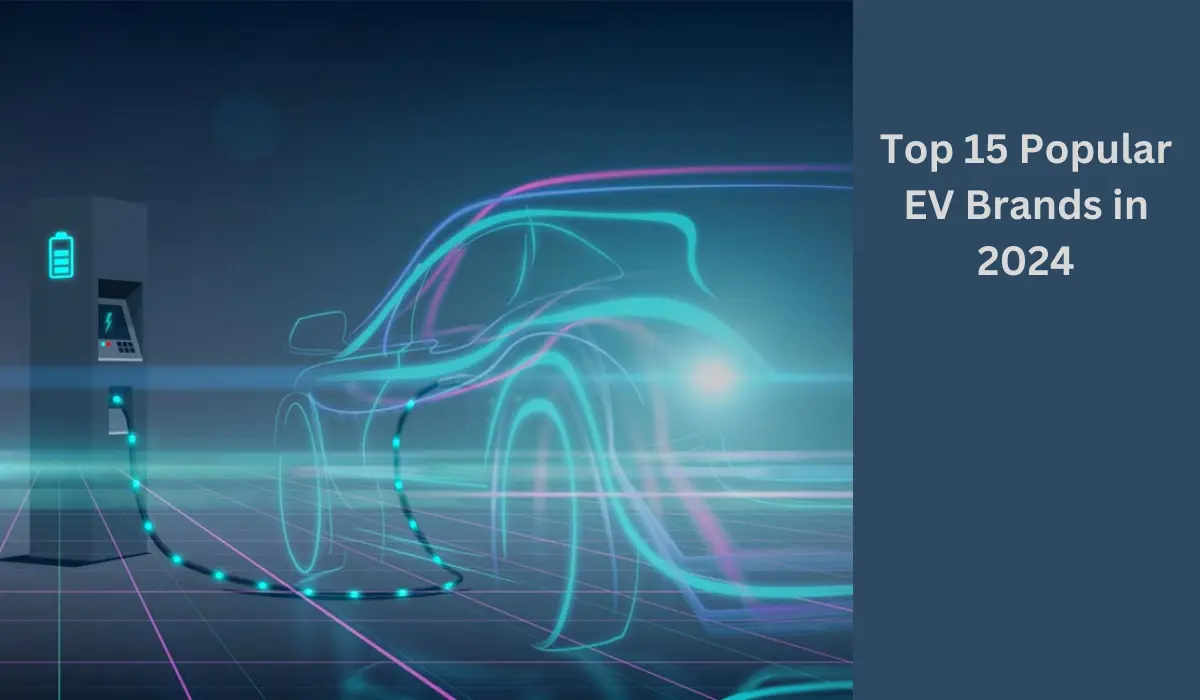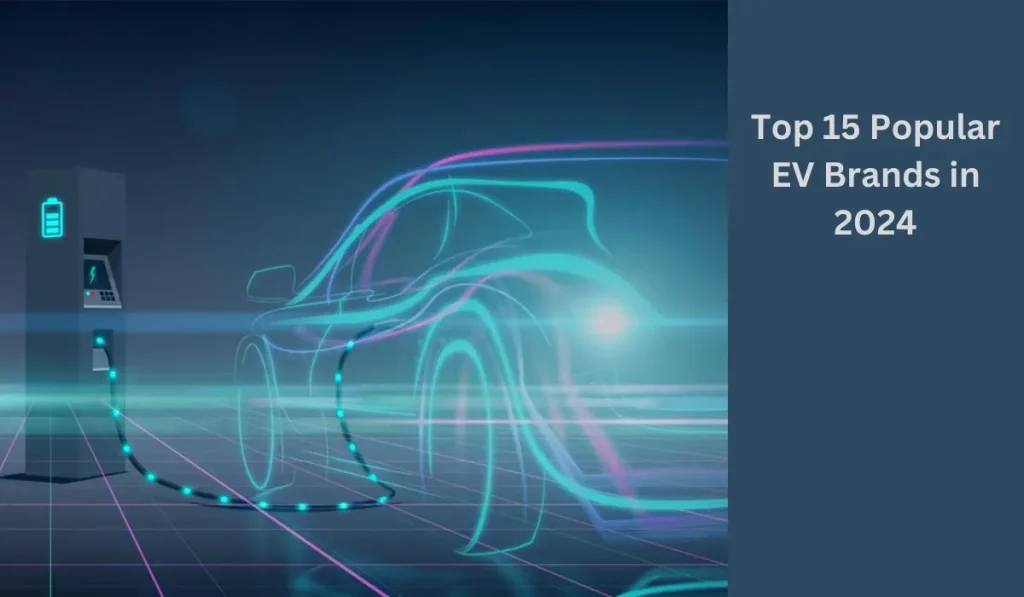In recent years, the automotive industry has undergone a revolutionary transformation with the advent of electric vehicles (EVs). As concerns about climate change and environmental sustainability have grown, electric vehicles have emerged as a promising solution to reduce carbon emissions and dependence on fossil fuels. This article explores the rise of electric vehicles, their benefits, challenges, future, and the Top 15 Popular EV Brands in 2024.
The Electric Vehicle Revolution
The electric vehicle revolution gained momentum as advancements in battery technology and increased environmental awareness converged. Traditional internal combustion engines, fueled by gasoline or diesel, have long been the standard in the automotive industry. However, the negative environmental impacts of burning fossil fuels, such as air pollution and greenhouse gas emissions, prompted a search for cleaner alternatives.
Electric vehicles, powered by electricity stored in high-capacity batteries, have risen to the forefront of this transformation. Companies like Tesla, Nissan, and Chevrolet have played key roles in popularizing electric cars, offering models with impressive ranges, sleek designs, and innovative features.
Benefits of Electric Vehicles
Electric vehicles (EVs) offer numerous benefits, contributing to their increasing popularity and adoption worldwide. Here are some key advantages of electric vehicles:
Environmental Impact:
Zero Emissions: Electric vehicles produce zero tailpipe emissions, reducing air pollution and contributing to improved air quality in urban areas.
Lower Greenhouse Gas Emissions: Even when considering emissions from electricity generation, EVs generally have a lower overall carbon footprint compared to traditional internal combustion engine vehicles. As the electricity grid transitions to renewable energy sources, the environmental benefits of EVs will continue to increase.
Cost Savings:
Lower Operating Costs: Electric vehicles have fewer moving parts and generally require less maintenance than traditional vehicles. There is no need for oil changes, and brake wear is reduced due to regenerative braking systems, resulting in potential long-term cost savings for EV owners.
Lower Fuel Costs: The cost of electricity is often lower than that of gasoline or diesel fuel, providing cost savings over the lifetime of the vehicle.
Energy Efficiency:
Higher Efficiency: Electric vehicles convert a higher percentage of the energy from the power source to the wheels, making them more energy-efficient than internal combustion engine vehicles. This efficiency contributes to better overall energy use and resource conservation.
Innovative Technology:
Advanced Features: Electric vehicles often come equipped with cutting-edge technology, including regenerative braking, instant torque, and sophisticated energy management systems.
Autonomous Driving: Many electric vehicles are at the forefront of autonomous driving technology, showcasing the potential for increased safety and convenience on the roads.
Government Incentives:
Subsidies and Tax Credits: Governments around the world provide various incentives to encourage the adoption of electric vehicles. These may include tax credits, rebates, and reduced registration fees, making EVs more financially attractive to consumers.
Reduced Noise Pollution:
Quieter Operation: Electric vehicles are generally quieter than traditional vehicles, contributing to reduced noise pollution in urban areas. This is particularly beneficial for creating more pleasant living environments.
Energy Security:
Diversification of Energy Sources: Electric vehicles contribute to the diversification of energy sources for transportation. By reducing reliance on fossil fuels, countries can enhance energy security and reduce vulnerability to fluctuations in oil prices.
Health Benefits:
Improved Air Quality: The reduction of air pollutants from zero-emission electric vehicles positively impacts public health, leading to a decrease in respiratory and cardiovascular diseases associated with poor air quality.
Incentives for Innovation:
Stimulating Technological Advances: The growing demand for electric vehicles encourages ongoing innovation in battery technology, charging infrastructure, and overall vehicle design. This innovation has broader implications for other industries and technologies.
As technology continues to advance and the infrastructure supporting electric vehicles expands, these benefits are likely to become even more pronounced, further driving the transition towards a cleaner and more sustainable transportation system.
Challenges and Solutions
While electric vehicles (EVs) offer numerous benefits, they also face challenges that can impact their widespread adoption. Here are some key challenges and potential solutions:
Range Anxiety:
Issue: Range anxiety refers to the fear of running out of battery power before reaching a charging station, especially in areas with limited charging infrastructure.
Solution: Advances in battery technology are extending the range of electric vehicles. Additionally, the development of fast-charging infrastructure and improved navigation systems help alleviate range anxiety.
Charging Infrastructure:
Issue: The availability and accessibility of charging stations can be a barrier to widespread EV adoption, particularly in regions with limited charging infrastructure.
Solution: Governments, businesses, and private entities are investing in the expansion of charging networks. Incentives for building public charging stations and collaborations between automakers and charging providers are helping address this challenge.
Charging Speed:
Issue: Despite advancements, charging an electric vehicle can still take longer than refueling a traditional vehicle with gasoline.
Solution: Fast-charging technologies, such as DC fast chargers, are becoming more prevalent. These chargers can significantly reduce charging times, making EVs more convenient for everyday use.
Battery Technology:
Issue: Current battery technology has limitations in terms of energy density, weight, and cost, which can impact the overall performance and affordability of electric vehicles.
Solution: Ongoing research and development in battery technology aim to improve energy density, reduce costs, and enhance overall performance. Innovations such as solid-state batteries hold the potential for significant advancements.
Initial Cost:
Issue: The upfront cost of purchasing an electric vehicle is often higher than that of a traditional internal combustion engine vehicle.
Solution: Government incentives, tax credits, and subsidies help offset the initial cost for consumers. As technology advances and economies of scale are realized, the cost of electric vehicles is expected to decrease over time.
Limited Model Availability:
Issue: The variety of electric vehicle models available in the market may be limited compared to traditional vehicles.
Solution: Automakers are expanding their electric vehicle offerings, introducing new models across different vehicle segments. Increased competition is likely to lead to a wider range of electric vehicle options for consumers.
Recycling and Disposal of Batteries:
Issue: The recycling and disposal of batteries present environmental challenges, as batteries may contain hazardous materials.
Solution: Research and development focus on developing sustainable battery recycling methods. Implementing responsible disposal practices and encouraging recycling initiatives can mitigate the environmental impact.
Public Awareness and Education:
Issue: Lack of awareness and understanding of electric vehicles may hinder consumer adoption.
Solution: Public awareness campaigns and educational initiatives can help dispel myths, provide accurate information about EVs, and promote their benefits. Governments and industry stakeholders play a role in disseminating information and fostering a positive perception of electric vehicles.
Vehicle Production Sustainability:
Issue: The environmental impact of manufacturing electric vehicles, especially in terms of raw material extraction and energy-intensive processes, is a concern.
Solution: Efforts are underway to enhance the sustainability of electric vehicle production. This includes sourcing materials responsibly, reducing energy consumption in manufacturing, and exploring alternative materials.
Addressing these challenges requires collaboration between governments, industry stakeholders, and the public. As technology continues to advance and infrastructure improves, electric vehicles are poised to overcome many of these obstacles, paving the way for a more sustainable and widespread adoption of clean transportation.
Top 15 Popular EV Brands
Here are 15 popular electric vehicle brands that are well-known globally:
BYD:
BYD (Build Your Dreams) is a Chinese multinational conglomerate with a significant presence in the electric vehicle (EV) market. Founded in 1995, BYD initially focused on rechargeable batteries and later expanded into various industries, including automobiles. The company has gained prominence as one of the leading EV manufacturers globally.
BYD started manufacturing electric vehicles in the mid-2000s and quickly became a significant player in the EV industry. The company produces a range of electric vehicles, including electric cars, buses, and commercial vehicles.
Tesla:
A pioneer in the electric vehicle market, Tesla is known for its high-performance electric cars and advanced autonomous driving features.
Tesla, Inc. is an American electric vehicle (EV) and clean energy company known for its groundbreaking contributions to the automotive industry.
Tesla was founded in 2003 by Martin Eberhard and Marc Tarpenning. Elon Musk joined the company shortly after, leading Tesla’s initial round of investment and eventually becoming its CEO.
Nissan:
Nissan is a well-known automotive manufacturer that has made significant contributions to the electric vehicle (EV) market. One of Nissan’s key electric vehicle models is the Nissan Leaf. It is one of the most beautiful small cars.
The Nissan Leaf is one of the best-selling electric cars globally was first introduced in 2010, contributing to the widespread adoption of electric vehicles.
Nissan continues to explore innovations in battery technology and electric vehicle design as part of its broader strategy to contribute to a more sustainable future.
BMW:
BMW, a renowned German luxury automaker, has made significant strides in the electric vehicle (EV) market. It offers a range of electric vehicles, including the i3 and i8, showcasing a blend of luxury and sustainability.
BMW’s electric vehicles combine the brand’s hallmark luxury and performance with sustainable and efficient electric mobility. As the automotive industry evolves, BMW remains at the forefront of innovation in the electric vehicle sector.
Audi:
It is a German luxury automotive brand, has been actively involved in the electric vehicle (EV) market, demonstrating its commitment to sustainable mobility. Audi’s electric lineup includes models like the e-tron and the sporty e-tron GT, combining performance and electric efficiency.
The company’s focus on combining luxury, performance, and advanced technology positions Audi as a key player in the evolving landscape of electric vehicles.
Porsche:
Porsche’s entry into the electric vehicle market with the Taycan reflects the industry’s shift towards electrification without compromising on performance and luxury. The Taycan has received acclaim for its innovative technology, powerful performance, and the distinctive driving experience synonymous with the Porsche brand.
Ford:
Ford, a prominent American automaker, has been actively engaged in the electric vehicle (EV) market, developing electric models and expanding its presence in the sustainable transportation sector.
The Mustang Mach-E and the upcoming electric Ford F-150 Lightning represent Ford’s commitment to electric mobility.
Chevrolet:
Chevrolet, a brand under General Motors (GM), has been active in the electric vehicle (EV) market, offering electric models as part of its commitment to sustainable transportation. One of Chevrolet’s notable electric vehicles is the Chevrolet Bolt EV.
The Chevrolet Bolt is a compact electric car that has gained popularity for its affordable price and long-range capabilities.
Hyundai:
Hyundai, a South Korean automotive manufacturer, has been actively involved in the electric vehicle (EV) market, offering a range of electric models that showcase the brand’s commitment to sustainable and efficient mobility.
The Hyundai Kona Electric and Ioniq Electric are among the popular electric models from this South Korean automaker.
Kia:
Kia, a South Korean automotive manufacturer, has made significant strides in the electric vehicle (EV) market, offering a range of electric models that emphasize efficiency, technology, and sustainability.
The Kia Soul EV and Niro EV have gained attention for their practicality and affordability in the electric vehicle market.
Volkswagen:
Volkswagen, one of the world’s largest automotive manufacturers, has been actively involved in the electric vehicle (EV) market with a dedicated focus on electric mobility. The company has introduced a range of electric models and has ambitious plans to become a leader in the electric vehicle segment.
It is making significant strides in electric mobility with models like the ID.3 and ID.4, part of their ID series.
Jaguar:
British luxury car manufacturer, Jaguar has been actively involved in the electric vehicle (EV) market, aiming to combine its legacy of high-performance vehicles with sustainable and efficient electric mobility.
The Jaguar I-PACE is an all-electric SUV that combines luxury with electric performance.
Mercedes-Benz:
Mercedes-Benz, a renowned German luxury automotive brand, has been actively involved in the electric vehicle (EV) market, blending luxury, performance, and innovative technology in its electric models.
It offers electric models under its EQ brand, including the EQC and EQS luxury sedan.
Volvo:
Swedish luxury automobile manufacturer, Volvo has been actively involved in the electric vehicle (EV) market, committing to the development and production of electric and plug-in hybrid vehicles. The company has set ambitious goals to become a leader in sustainable mobility.
Volvo has committed to electric mobility, with models like the XC40 Recharge and plans for a fully electric lineup in the future.
Rivian:
Rivian is an American electric vehicle (EV) manufacturer that has gained attention for its innovative electric trucks and SUVs. Founded in 2009 by Robert “RJ” Scaringe, Rivian has positioned itself as a company focused on adventure-oriented electric vehicles with a strong emphasis on performance and sustainability.
An American electric vehicle startup, Rivian gained attention for its R1T electric truck and R1S electric SUV.
Also Read:
The Future of Electric Vehicles
The future of electric vehicles looks promising as technological advancements continue to address existing challenges. Governments around the world are incentivizing the adoption of electric vehicles through subsidies, tax credits, and infrastructure investments. Automakers are also investing heavily in research and development to improve battery technology, increase range, and enhance overall performance.
As electric vehicles become more mainstream, we can expect to see a shift towards a cleaner, more sustainable transportation system. The combination of environmental benefits, cost savings, and ongoing innovation positions electric vehicles as a key player in shaping the future of the automotive industry.
1. Increased Adoption:
Growing environmental concerns, government incentives, and advancements in technology are expected to drive increased adoption of electric vehicles. Consumers are becoming more receptive to EVs due to improvements in range, charging infrastructure, and overall performance.
2. Advancements in Battery Technology:
Battery technology is a critical factor in the success of electric vehicles. Continued advancements, including higher energy density, faster charging, and cost reduction, are anticipated. Solid-state batteries and other emerging technologies hold promise for further enhancing EV performance.
3. Extended Range:
Manufacturers are focused on increasing the range of electric vehicles on a single charge. This will address “range anxiety” concerns and make EVs more practical for a broader range of consumers, including those with longer commutes.
4. Diverse Vehicle Offerings:
The future will likely see a wider variety of electric vehicle models across different segments, including sedans, SUVs, trucks, and even performance-oriented vehicles. Electric mobility is expected to extend beyond traditional passenger cars to encompass diverse transportation solutions.
5. Autonomous and Connected Features:
Electric vehicles are likely to incorporate advanced autonomous driving capabilities and connected features. This includes improved driver-assistance systems, over-the-air updates, and integration with smart infrastructure for a seamless driving experience.
6. Charging Infrastructure Expansion:
Governments, businesses, and charging infrastructure providers are expected to invest heavily in expanding the charging infrastructure. Faster-charging technologies, increased charging station density, and interoperability will contribute to making electric vehicle charging more convenient.
7. Rise of Electric SUVs and Trucks:
The popularity of electric SUVs and trucks is expected to rise, with automakers focusing on delivering electric alternatives in these segments. This shift is driven by consumer preferences for larger and more versatile vehicles.
8. Innovative Business Models:
The electric vehicle ecosystem may witness the emergence of innovative business models, such as battery-swapping services, vehicle-to-grid (V2G) integration, and subscription-based ownership models. These approaches aim to address user needs and make EV ownership more accessible.
9. Environmental and Regulatory Pressures:
We expect that global automakers can accelerate their transition to electric vehicles to reduce carbon emissions. Governments worldwide are likely to implement stricter emission standards and offer additional incentives for EV adoption.
Also Read
End Words
Electric vehicles represent a significant step towards a greener and more sustainable future. The electric vehicles can play a vital role in combating climate change.







